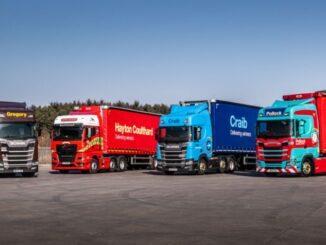
Gregory Distribution Holdings saw a “turbulent” year in 2021 as it battled the impact of the driver shortage crisis and wage inflation which hit the profitability of its pallet network operations.
The family-owned firm, which is a member of both Palletways and Palletline, operates a fleet of over 1,000 vehicles and around 1,900 trailers and specialises in ambient and temperature controlled palletised services, as well as ambient and chilled warehousing.
It employs over 2,300 staff across 35 locations including depots in Exeter, Plymouth, Shepton Mallet, Cullompton, Bristol, Birmingham, Aberdeen, Stockton-on-Tees, Great Yarmouth and Cumbernauld.
During the year the group added Pollock Holdings and its subsidiaries Pollock (Scotrans) and Pollock Express to its stable, which includes ARR Craib Transport and a joint venture with Hayton Coulthard.
According to its latest annual results to 2 October 2021 the group’s pre-tax profits remained static at £11m in the year to 2 October 2021, despite its turnover rising to £273.4m (2020: £238.3m).
Within the group, Gregory Distribution saw turnover rise to £215.5m (2020: £195m) whilst pre-tax profit fell to £9.3m (2020: £10.5m).
Its sister company ARR Craib Transport also saw a fall in turnover, down from £44m in 2020 to £43.1m in 2021. However its pre-tax profit more than doubled to £840,000 (2020: £378,000).
The group’s latest acquisition, Pollock Holdings, acquired in March 2021, contributed £16.4m in turnover and £392,000 in profit after tax between the date of the acquisition and the balance sheet date.
According to the strategic report to the group’s results, the year began well with Pollock Holdings boosting the firm’s market share in Scotland as well as bringing on board “significant” new customers and delivering growth within the existing customer base.
Read more
- Gregory Group ‘Delivering Winners’ with new brand alignment
- Gregory Distribution commissions Freeway to help integrate acquisitions of ARR Craib and Pollock (Scotrans)
- Gregory Distribution adds 12 biomethane-powered Volvo FM Globetrotters to fleet
As the company entered the second half of the year it benefitted from “exceptionally high volumes” as customers restocked post pandemic lockdown and via the surge in staycations in the South West of England and Scotland, which are both key business areas for the group.
However, at the same time the driver shortage reached crisis point – a problem which the group said was felt “most significantly” in its pallet network operations in the South West, which struggled to keep up with a post lockdown 70% uplift in volume.
The resultant wage inflation also took its toll with the strategic report stating that the combination of the two had “a significant impact on our profitability for the year”.
To add to its woes, the group also struggled with a shortage of warehousing staff and mechanics, which added further wage pressures.
In addition the delay in fuel deliveries in the autumn - after a shortage of fuel drivers sparked panic buying at the pumps - resulted in delayed deliveries to the group’s depots, forcing it to purchase supplies from alternative suppliers at a higher price.
In response to the driver shortage Gregory Distribution Holdings said it has “substantially” increased the investment in its driver apprenticeship scheme. The strategic report noted: “We have recruited additional trainers and doubled the number of apprentices with the aim of training 230 new drivers in the coming year.”
During the year the group also expanded its warehouse footprint significantly acquiring an 80,000sq ft facility in Devon and a 100,00sq ft warehouse in Scotland.
It also leased a 200,000 sq ft facility in the Midlands to boost its warehousing and transport footprint in the region.
Since the year end the business has also taken on a further 160,000sq ft facility in the Bristol area to support expansion of an existing customer, the report added.
Despite the challenges the group faced in 2021 the strategic report said that the directors are confident of further increases in margins and profitability this year, as the Pollock acquisition continues to bed in and as the increased costs of wages and fuel is recovered from customers.














